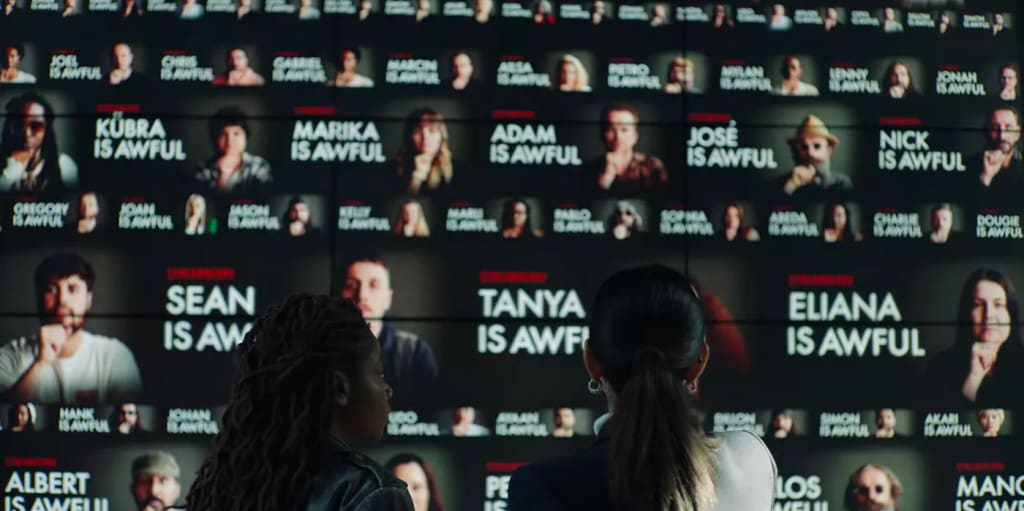Can Netflix Critique Itself? (ft. Black Mirror)
The streaming company has no intention of being self-aware

Netflix recently launched its sixth season of the anthology series Black Mirror, and its inaugural episode, Joan Is Awful, is quite a doozy. The episode is a bit of self-parody where a Streamberry viewer (i.e. a viewer from a platform very similar to Netflix) named Joan watches in horror as a show is aired based exactly on her life, plus or minus some significant embellishments (she is played by Salma Hayek, yall).
The second episode, Loch Henry, continues the self-parodying trend with amateur documentarians attempting to create content about a series of gruesome murders in one of their hometowns. They ultimately create this content for Streamberry, and we get an examination of the behind-the-scenes nature of how this content is made and what purposes it serves.
What follows are narratives that heavily come down against the content media environment Netflix helped build. This type of product raises the interesting question of “whether a company like Netflix can actually be receptive to such commentary, even for the ones aired on its own platform?”
The content
At every turn, we are meant to find this content ecosystem to be morally dubious. A scene early on in Joan Is Awful shows Joan consulting a lawyer and learning how the company Streamberry has every right to violate her privacy like this. "…you assigned them the right to exploit all of that," the lawyer explains. "Terms of service.…it would have popped up on your phone or whatever when you first signed up for Streamberry."
Taking advantage of the obscure ToS agreements all software has you sign is a nightmare scenario and not one many viewers probably support. What follows is a morality play on the dangers of this invasion of privacy. We see Joan's life goes quickly off the rails. She is fired because the show releases her company's information, her finance leaves her, and the public comes to truly hate her.
Joan eventually hatches a plot to stop this show from being produced, which turns out to be the result of some magical quantum computer technology tapping into the 21st century's vast surveillance system all of us opted into via phones and the Internet of Things. The show doesn't bother to examine the specifics, as it's too busy engaging in shenanigans with Salma Hayek, fun double twists about the nature of consciousness in a simulation, and cool celebrity cameos.
You will either find that misdirect tacky and frustrating or fun and entertaining, but wherever you fall on that spectrum, the episode ultimately has little respect for that magical quantum computer technology. It ends with the version of Joan we have been watching smashing the quantum computer. It's revealed that we have been watching a "fake" reality all along. We then cut to the "real" Joan, whose life after destroying the show is better off now that she has taken "charge" of her life.
Likewise, the central premise of Loch Henry is how alienating the content production of true crime documentaries is for the actual victims of said crimes. The twist is that one of the documentarians is too close to the subject matter he is filming. This leads to a series of events that end the lives of both the character Davis's mother and partner. The narrative finishes on a pan of Davis's face alone in a hotel room after the Streamberry series, based on his attempt to uncover the truth, wins a prestigious award. He has success but now feels empty.
We can dive into whether these endings are good stories, but something that I would like to focus on is what it even means for a company like Netflix to produce and profit from such commentary.
The platform
I am not convinced this network will change its behavior after delivering this "self-referential" commentary. The second episode of this season, Loch Henry, which effectively is about how manipulative true crime documentaries are, rings hollow because we all know the platform will not change its behavior in this area. They have released hundreds of such documentaries, and in 2024, we see no signs of this trend stopping.
It isn't just the content either, but how this company responds to criticism. They don't seem to care about growth (outside the financial kind), often telling both internal and external critics to go "fuck themselves," just like the Streamberry representative did to Salma Hayek in Joan Is Awful. Following the Dave Chappelle The Closer controversy, Netflix forwarded an internal memo telling employees to quit if they were offended by the content the company produced. As employees organized around that issue, several were fired, and now that we are amid an anti-trans backlash, the company hasn't appeared to backtrack with the original content (note: a settlement of some kind has been reached, but the details on it are sparse, and it does not change this original point).
There is this frustrating standard where the company puts out “diverse” content that they receive awards and accolades for — content that appears to be the first on the chopping block when financial troubles arise — and then uses that to justify their more problematic moves. As then-co-CEO Ted Sarandos justified in that 2022 memo where he told employees to get over themselves:
“…content on screen doesn’t directly translate to real-world harm…We have ‘Sex Education,’ ‘Orange Is the New Black,’ ‘Control Z,’ Hannah Gadsby and Dave Chappelle all on Netflix. Key to this is increasing diversity on the content team itself.”
We see here how Netflix leadership is comfortable weaponizing the more leftist or progressive content they produce and then using its existence to defend and, in some cases, finance more regressive content.
Take, for example, the hit drama Squid Game, a pretty on-the-nose commentary about how our economic system is corrosive. It's about a game show where contestants fight with their lives to secure a considerable cash sum. The contestants on this deadly game show find themselves there by "choice" because of the financial destitution they are enduring outside the games — remove capitalism, and it seems doubtful that the Squid Game would have many contestants (see America is the Squid Game).
And so, what does this Network do with that commentary?
They greenlit a reality show (see Squid Game: The Challenge) that attempted to replicate the actual games of the Squid Game without the satire (i.e., playing it straight as an actual game show, sans the killing off of their contestants). Reality shows are a product that started as a way to circumvent union labor (see the previous writer's strike), and this production has been likewise fraught with reported labor issues. As reported on the infamous Red Light-Green Light challenge filmed during a cold snap in Variety:
“…as the game got underway, the atmosphere changed. Coats were taken away; hand and foot warmers were scooped out of pockets and plimsolls; and the players’ jackets had to remain unzipped in order to display their numbers as well as the fake blood that would squirt from devices strapped to their chests if they were eliminated. When the show’s giant killer doll stopped singing, they had to freeze in position — but what began as the promised two-minute wait was quickly bumped up to 10 and then 15 minutes. Marlene says she counted a 26-minute wait during one round. (Sources close to the production say the wait time increased to allow independent adjudicators to assess the gameplay.”
Netflix has denied these and other allegations; however, it's hard to take that denial seriously when we have established that they have a history of refusing to respond well to criticism. They also have a history of engaging with other production companies that have reported labor violations (see Love Is Blind).
There does not appear to be much self-reflection with this company's leadership. If Netflix had a Streamberry-esque quantum computer that allowed them to produce Joan Is Awful content based on a technicality like in the show, they probably would.
The point
The thing I keep gravitating to is why call it Streamberry?
Typically, the distancing done in a film or TV show of making a fake brand is for legal or financial reasons. A company doesn't want to suffer a lawsuit from a pissed-off brand, or they don't want to give a competitor free publicity.
In the case of Black Mirror, however, they are parodying themselves. Netflix is the entity that paid for and is hosting this content. This distancing is unnecessary from a legal or financial standpoint and has to do more with psychological distancing. The company may be parodying itself for laughs and profit, but it has no intention of being held accountable or changing its behavior.
A result of true self-reflection is change. If Netflix is still doing the same awful things it has always done (i.e., the promotion of harmful content, suppressing employee organizing, and potential labor violations), then what this new season of Black Mirror represents is not self-reflection but the packaging of the aesthetic of self-reflection to sell as a commercialized product — to you.
And what could be more dystopian than that?
About the Creator
Alex Mell-Taylor
I write long-form pieces on timely themes inside entertainment, pop culture, video games, gender, sexuality, race and politics. My writing currently reaches a growing audience of over 10,000 people every month across various publications.






Comments
There are no comments for this story
Be the first to respond and start the conversation.